Leading Strategic Change
VerifiedAdded on 2023/04/20
|9
|2919
|52
AI Summary
This essay discusses the role of leadership in managing change and highlights the leadership qualities of McCall, CEO of easy Jet. It explores the importance of communication, collaboration, and commitment in change management. The essay also addresses the characteristics of good leaders and the issues faced during change management. Overall, it emphasizes the crucial role of leaders in adapting to and driving change within an organization.
Contribute Materials
Your contribution can guide someone’s learning journey. Share your
documents today.

Leading strategic change
Changing management
programme upon strong leadership
Student name
Changing management
programme upon strong leadership
Student name
Secure Best Marks with AI Grader
Need help grading? Try our AI Grader for instant feedback on your assignments.
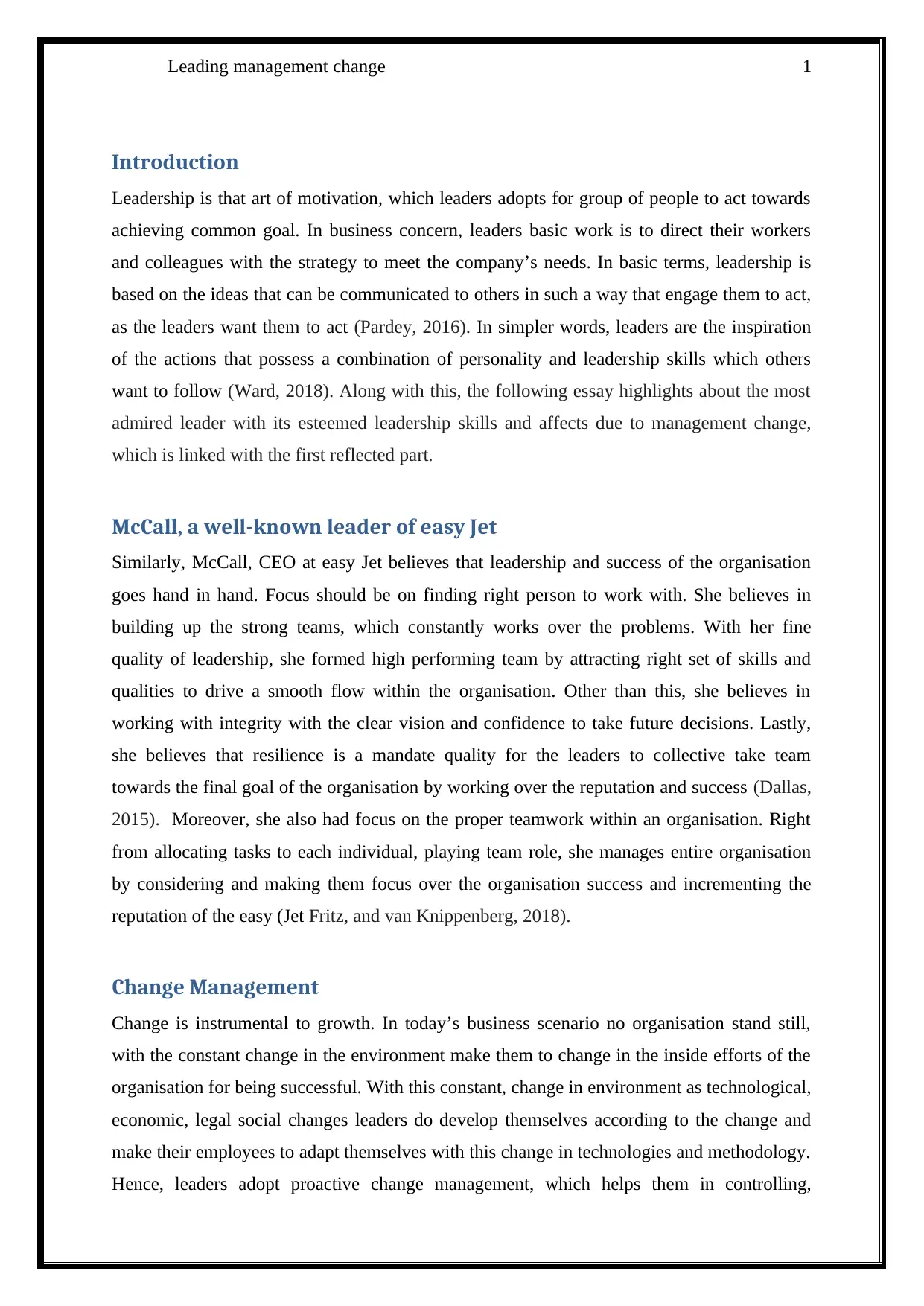
Leading management change 1
Introduction
Leadership is that art of motivation, which leaders adopts for group of people to act towards
achieving common goal. In business concern, leaders basic work is to direct their workers
and colleagues with the strategy to meet the company’s needs. In basic terms, leadership is
based on the ideas that can be communicated to others in such a way that engage them to act,
as the leaders want them to act (Pardey, 2016). In simpler words, leaders are the inspiration
of the actions that possess a combination of personality and leadership skills which others
want to follow (Ward, 2018). Along with this, the following essay highlights about the most
admired leader with its esteemed leadership skills and affects due to management change,
which is linked with the first reflected part.
McCall, a well-known leader of easy Jet
Similarly, McCall, CEO at easy Jet believes that leadership and success of the organisation
goes hand in hand. Focus should be on finding right person to work with. She believes in
building up the strong teams, which constantly works over the problems. With her fine
quality of leadership, she formed high performing team by attracting right set of skills and
qualities to drive a smooth flow within the organisation. Other than this, she believes in
working with integrity with the clear vision and confidence to take future decisions. Lastly,
she believes that resilience is a mandate quality for the leaders to collective take team
towards the final goal of the organisation by working over the reputation and success (Dallas,
2015). Moreover, she also had focus on the proper teamwork within an organisation. Right
from allocating tasks to each individual, playing team role, she manages entire organisation
by considering and making them focus over the organisation success and incrementing the
reputation of the easy (Jet Fritz, and van Knippenberg, 2018).
Change Management
Change is instrumental to growth. In today’s business scenario no organisation stand still,
with the constant change in the environment make them to change in the inside efforts of the
organisation for being successful. With this constant, change in environment as technological,
economic, legal social changes leaders do develop themselves according to the change and
make their employees to adapt themselves with this change in technologies and methodology.
Hence, leaders adopt proactive change management, which helps them in controlling,
Introduction
Leadership is that art of motivation, which leaders adopts for group of people to act towards
achieving common goal. In business concern, leaders basic work is to direct their workers
and colleagues with the strategy to meet the company’s needs. In basic terms, leadership is
based on the ideas that can be communicated to others in such a way that engage them to act,
as the leaders want them to act (Pardey, 2016). In simpler words, leaders are the inspiration
of the actions that possess a combination of personality and leadership skills which others
want to follow (Ward, 2018). Along with this, the following essay highlights about the most
admired leader with its esteemed leadership skills and affects due to management change,
which is linked with the first reflected part.
McCall, a well-known leader of easy Jet
Similarly, McCall, CEO at easy Jet believes that leadership and success of the organisation
goes hand in hand. Focus should be on finding right person to work with. She believes in
building up the strong teams, which constantly works over the problems. With her fine
quality of leadership, she formed high performing team by attracting right set of skills and
qualities to drive a smooth flow within the organisation. Other than this, she believes in
working with integrity with the clear vision and confidence to take future decisions. Lastly,
she believes that resilience is a mandate quality for the leaders to collective take team
towards the final goal of the organisation by working over the reputation and success (Dallas,
2015). Moreover, she also had focus on the proper teamwork within an organisation. Right
from allocating tasks to each individual, playing team role, she manages entire organisation
by considering and making them focus over the organisation success and incrementing the
reputation of the easy (Jet Fritz, and van Knippenberg, 2018).
Change Management
Change is instrumental to growth. In today’s business scenario no organisation stand still,
with the constant change in the environment make them to change in the inside efforts of the
organisation for being successful. With this constant, change in environment as technological,
economic, legal social changes leaders do develop themselves according to the change and
make their employees to adapt themselves with this change in technologies and methodology.
Hence, leaders adopt proactive change management, which helps them in controlling,
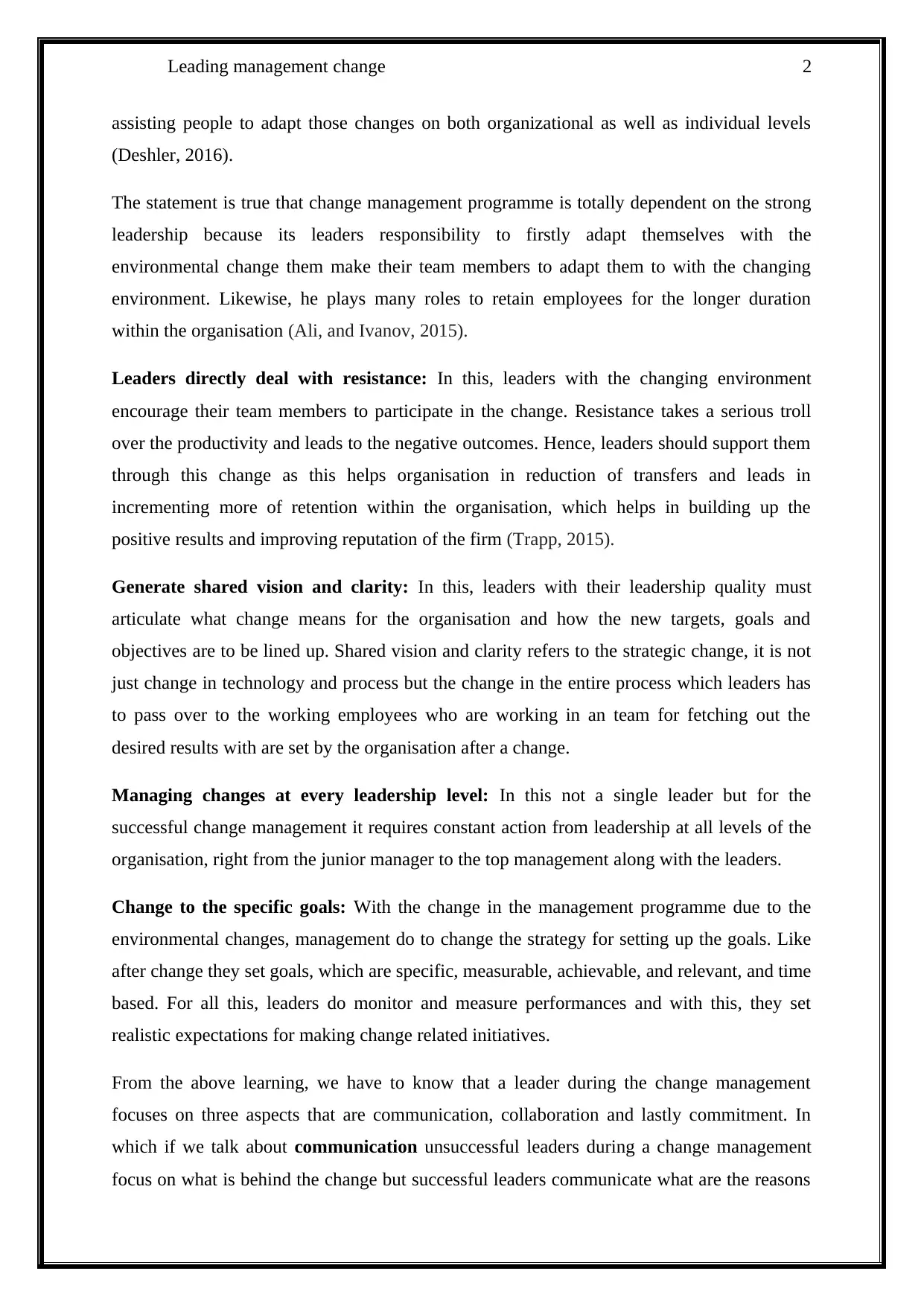
Leading management change 2
assisting people to adapt those changes on both organizational as well as individual levels
(Deshler, 2016).
The statement is true that change management programme is totally dependent on the strong
leadership because its leaders responsibility to firstly adapt themselves with the
environmental change them make their team members to adapt them to with the changing
environment. Likewise, he plays many roles to retain employees for the longer duration
within the organisation (Ali, and Ivanov, 2015).
Leaders directly deal with resistance: In this, leaders with the changing environment
encourage their team members to participate in the change. Resistance takes a serious troll
over the productivity and leads to the negative outcomes. Hence, leaders should support them
through this change as this helps organisation in reduction of transfers and leads in
incrementing more of retention within the organisation, which helps in building up the
positive results and improving reputation of the firm (Trapp, 2015).
Generate shared vision and clarity: In this, leaders with their leadership quality must
articulate what change means for the organisation and how the new targets, goals and
objectives are to be lined up. Shared vision and clarity refers to the strategic change, it is not
just change in technology and process but the change in the entire process which leaders has
to pass over to the working employees who are working in an team for fetching out the
desired results with are set by the organisation after a change.
Managing changes at every leadership level: In this not a single leader but for the
successful change management it requires constant action from leadership at all levels of the
organisation, right from the junior manager to the top management along with the leaders.
Change to the specific goals: With the change in the management programme due to the
environmental changes, management do to change the strategy for setting up the goals. Like
after change they set goals, which are specific, measurable, achievable, and relevant, and time
based. For all this, leaders do monitor and measure performances and with this, they set
realistic expectations for making change related initiatives.
From the above learning, we have to know that a leader during the change management
focuses on three aspects that are communication, collaboration and lastly commitment. In
which if we talk about communication unsuccessful leaders during a change management
focus on what is behind the change but successful leaders communicate what are the reasons
assisting people to adapt those changes on both organizational as well as individual levels
(Deshler, 2016).
The statement is true that change management programme is totally dependent on the strong
leadership because its leaders responsibility to firstly adapt themselves with the
environmental change them make their team members to adapt them to with the changing
environment. Likewise, he plays many roles to retain employees for the longer duration
within the organisation (Ali, and Ivanov, 2015).
Leaders directly deal with resistance: In this, leaders with the changing environment
encourage their team members to participate in the change. Resistance takes a serious troll
over the productivity and leads to the negative outcomes. Hence, leaders should support them
through this change as this helps organisation in reduction of transfers and leads in
incrementing more of retention within the organisation, which helps in building up the
positive results and improving reputation of the firm (Trapp, 2015).
Generate shared vision and clarity: In this, leaders with their leadership quality must
articulate what change means for the organisation and how the new targets, goals and
objectives are to be lined up. Shared vision and clarity refers to the strategic change, it is not
just change in technology and process but the change in the entire process which leaders has
to pass over to the working employees who are working in an team for fetching out the
desired results with are set by the organisation after a change.
Managing changes at every leadership level: In this not a single leader but for the
successful change management it requires constant action from leadership at all levels of the
organisation, right from the junior manager to the top management along with the leaders.
Change to the specific goals: With the change in the management programme due to the
environmental changes, management do to change the strategy for setting up the goals. Like
after change they set goals, which are specific, measurable, achievable, and relevant, and time
based. For all this, leaders do monitor and measure performances and with this, they set
realistic expectations for making change related initiatives.
From the above learning, we have to know that a leader during the change management
focuses on three aspects that are communication, collaboration and lastly commitment. In
which if we talk about communication unsuccessful leaders during a change management
focus on what is behind the change but successful leaders communicate what are the reasons
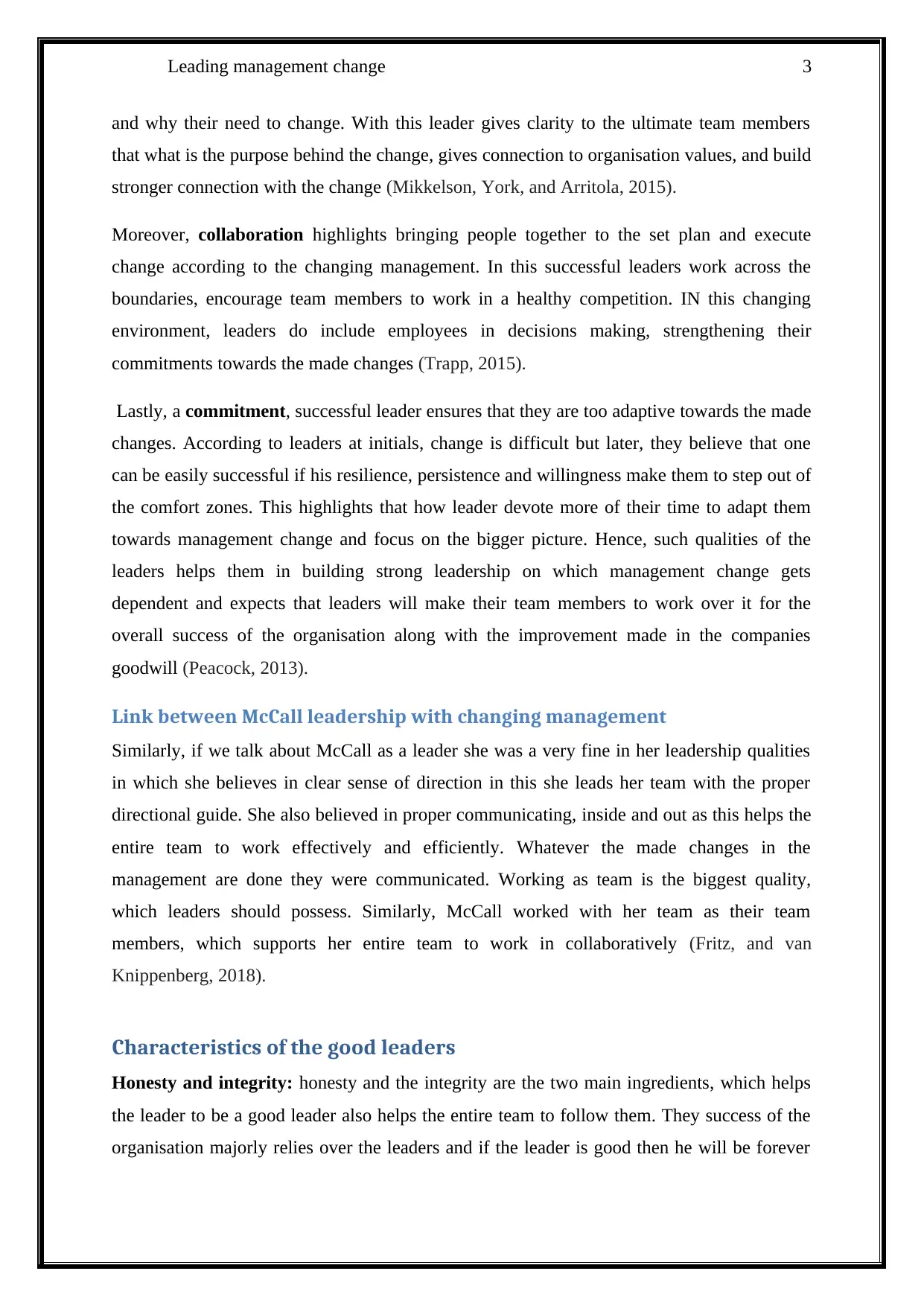
Leading management change 3
and why their need to change. With this leader gives clarity to the ultimate team members
that what is the purpose behind the change, gives connection to organisation values, and build
stronger connection with the change (Mikkelson, York, and Arritola, 2015).
Moreover, collaboration highlights bringing people together to the set plan and execute
change according to the changing management. In this successful leaders work across the
boundaries, encourage team members to work in a healthy competition. IN this changing
environment, leaders do include employees in decisions making, strengthening their
commitments towards the made changes (Trapp, 2015).
Lastly, a commitment, successful leader ensures that they are too adaptive towards the made
changes. According to leaders at initials, change is difficult but later, they believe that one
can be easily successful if his resilience, persistence and willingness make them to step out of
the comfort zones. This highlights that how leader devote more of their time to adapt them
towards management change and focus on the bigger picture. Hence, such qualities of the
leaders helps them in building strong leadership on which management change gets
dependent and expects that leaders will make their team members to work over it for the
overall success of the organisation along with the improvement made in the companies
goodwill (Peacock, 2013).
Link between McCall leadership with changing management
Similarly, if we talk about McCall as a leader she was a very fine in her leadership qualities
in which she believes in clear sense of direction in this she leads her team with the proper
directional guide. She also believed in proper communicating, inside and out as this helps the
entire team to work effectively and efficiently. Whatever the made changes in the
management are done they were communicated. Working as team is the biggest quality,
which leaders should possess. Similarly, McCall worked with her team as their team
members, which supports her entire team to work in collaboratively (Fritz, and van
Knippenberg, 2018).
Characteristics of the good leaders
Honesty and integrity: honesty and the integrity are the two main ingredients, which helps
the leader to be a good leader also helps the entire team to follow them. They success of the
organisation majorly relies over the leaders and if the leader is good then he will be forever
and why their need to change. With this leader gives clarity to the ultimate team members
that what is the purpose behind the change, gives connection to organisation values, and build
stronger connection with the change (Mikkelson, York, and Arritola, 2015).
Moreover, collaboration highlights bringing people together to the set plan and execute
change according to the changing management. In this successful leaders work across the
boundaries, encourage team members to work in a healthy competition. IN this changing
environment, leaders do include employees in decisions making, strengthening their
commitments towards the made changes (Trapp, 2015).
Lastly, a commitment, successful leader ensures that they are too adaptive towards the made
changes. According to leaders at initials, change is difficult but later, they believe that one
can be easily successful if his resilience, persistence and willingness make them to step out of
the comfort zones. This highlights that how leader devote more of their time to adapt them
towards management change and focus on the bigger picture. Hence, such qualities of the
leaders helps them in building strong leadership on which management change gets
dependent and expects that leaders will make their team members to work over it for the
overall success of the organisation along with the improvement made in the companies
goodwill (Peacock, 2013).
Link between McCall leadership with changing management
Similarly, if we talk about McCall as a leader she was a very fine in her leadership qualities
in which she believes in clear sense of direction in this she leads her team with the proper
directional guide. She also believed in proper communicating, inside and out as this helps the
entire team to work effectively and efficiently. Whatever the made changes in the
management are done they were communicated. Working as team is the biggest quality,
which leaders should possess. Similarly, McCall worked with her team as their team
members, which supports her entire team to work in collaboratively (Fritz, and van
Knippenberg, 2018).
Characteristics of the good leaders
Honesty and integrity: honesty and the integrity are the two main ingredients, which helps
the leader to be a good leader also helps the entire team to follow them. They success of the
organisation majorly relies over the leaders and if the leader is good then he will be forever
Secure Best Marks with AI Grader
Need help grading? Try our AI Grader for instant feedback on your assignments.
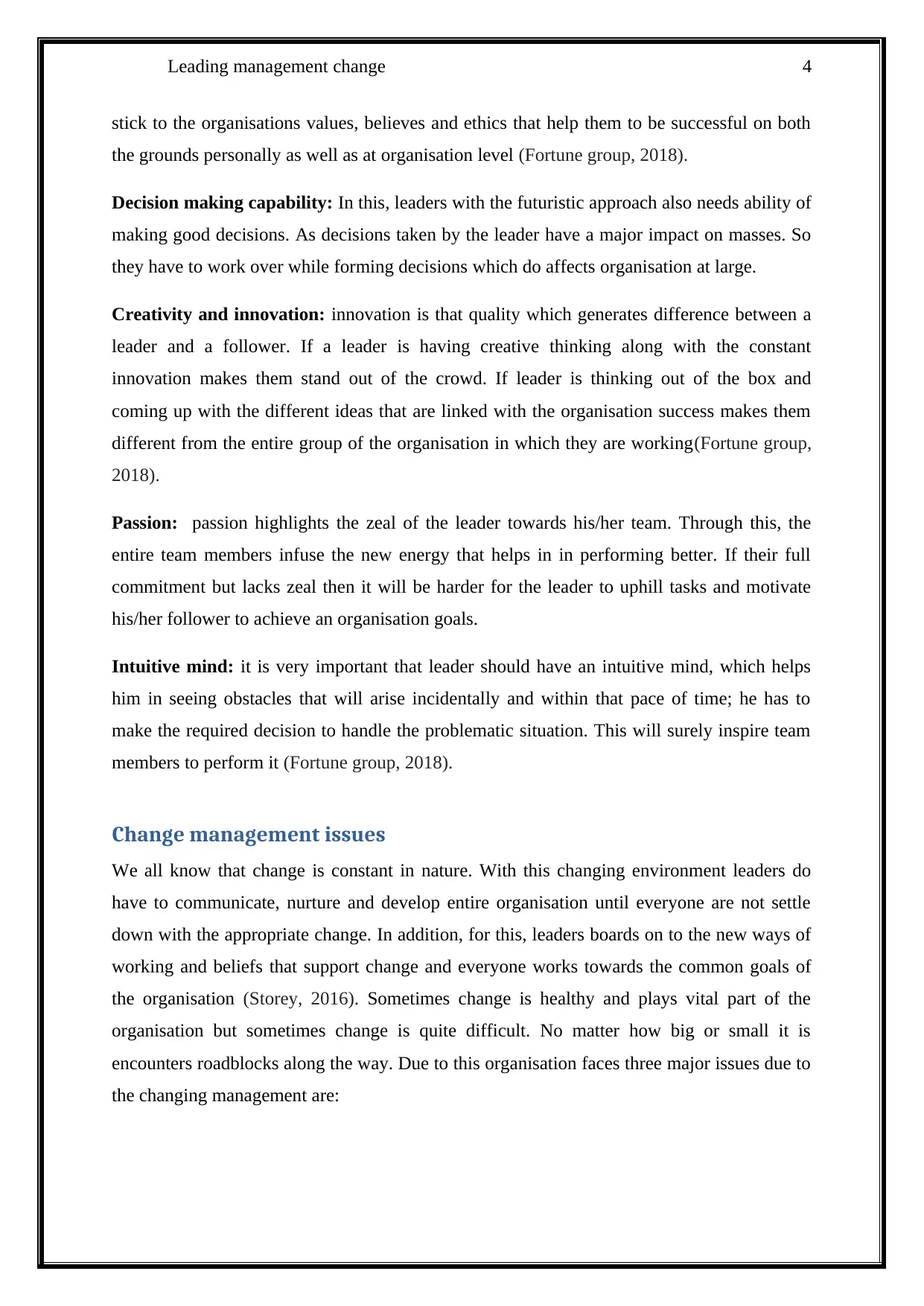
Leading management change 4
stick to the organisations values, believes and ethics that help them to be successful on both
the grounds personally as well as at organisation level (Fortune group, 2018).
Decision making capability: In this, leaders with the futuristic approach also needs ability of
making good decisions. As decisions taken by the leader have a major impact on masses. So
they have to work over while forming decisions which do affects organisation at large.
Creativity and innovation: innovation is that quality which generates difference between a
leader and a follower. If a leader is having creative thinking along with the constant
innovation makes them stand out of the crowd. If leader is thinking out of the box and
coming up with the different ideas that are linked with the organisation success makes them
different from the entire group of the organisation in which they are working(Fortune group,
2018).
Passion: passion highlights the zeal of the leader towards his/her team. Through this, the
entire team members infuse the new energy that helps in in performing better. If their full
commitment but lacks zeal then it will be harder for the leader to uphill tasks and motivate
his/her follower to achieve an organisation goals.
Intuitive mind: it is very important that leader should have an intuitive mind, which helps
him in seeing obstacles that will arise incidentally and within that pace of time; he has to
make the required decision to handle the problematic situation. This will surely inspire team
members to perform it (Fortune group, 2018).
Change management issues
We all know that change is constant in nature. With this changing environment leaders do
have to communicate, nurture and develop entire organisation until everyone are not settle
down with the appropriate change. In addition, for this, leaders boards on to the new ways of
working and beliefs that support change and everyone works towards the common goals of
the organisation (Storey, 2016). Sometimes change is healthy and plays vital part of the
organisation but sometimes change is quite difficult. No matter how big or small it is
encounters roadblocks along the way. Due to this organisation faces three major issues due to
the changing management are:
stick to the organisations values, believes and ethics that help them to be successful on both
the grounds personally as well as at organisation level (Fortune group, 2018).
Decision making capability: In this, leaders with the futuristic approach also needs ability of
making good decisions. As decisions taken by the leader have a major impact on masses. So
they have to work over while forming decisions which do affects organisation at large.
Creativity and innovation: innovation is that quality which generates difference between a
leader and a follower. If a leader is having creative thinking along with the constant
innovation makes them stand out of the crowd. If leader is thinking out of the box and
coming up with the different ideas that are linked with the organisation success makes them
different from the entire group of the organisation in which they are working(Fortune group,
2018).
Passion: passion highlights the zeal of the leader towards his/her team. Through this, the
entire team members infuse the new energy that helps in in performing better. If their full
commitment but lacks zeal then it will be harder for the leader to uphill tasks and motivate
his/her follower to achieve an organisation goals.
Intuitive mind: it is very important that leader should have an intuitive mind, which helps
him in seeing obstacles that will arise incidentally and within that pace of time; he has to
make the required decision to handle the problematic situation. This will surely inspire team
members to perform it (Fortune group, 2018).
Change management issues
We all know that change is constant in nature. With this changing environment leaders do
have to communicate, nurture and develop entire organisation until everyone are not settle
down with the appropriate change. In addition, for this, leaders boards on to the new ways of
working and beliefs that support change and everyone works towards the common goals of
the organisation (Storey, 2016). Sometimes change is healthy and plays vital part of the
organisation but sometimes change is quite difficult. No matter how big or small it is
encounters roadblocks along the way. Due to this organisation faces three major issues due to
the changing management are:
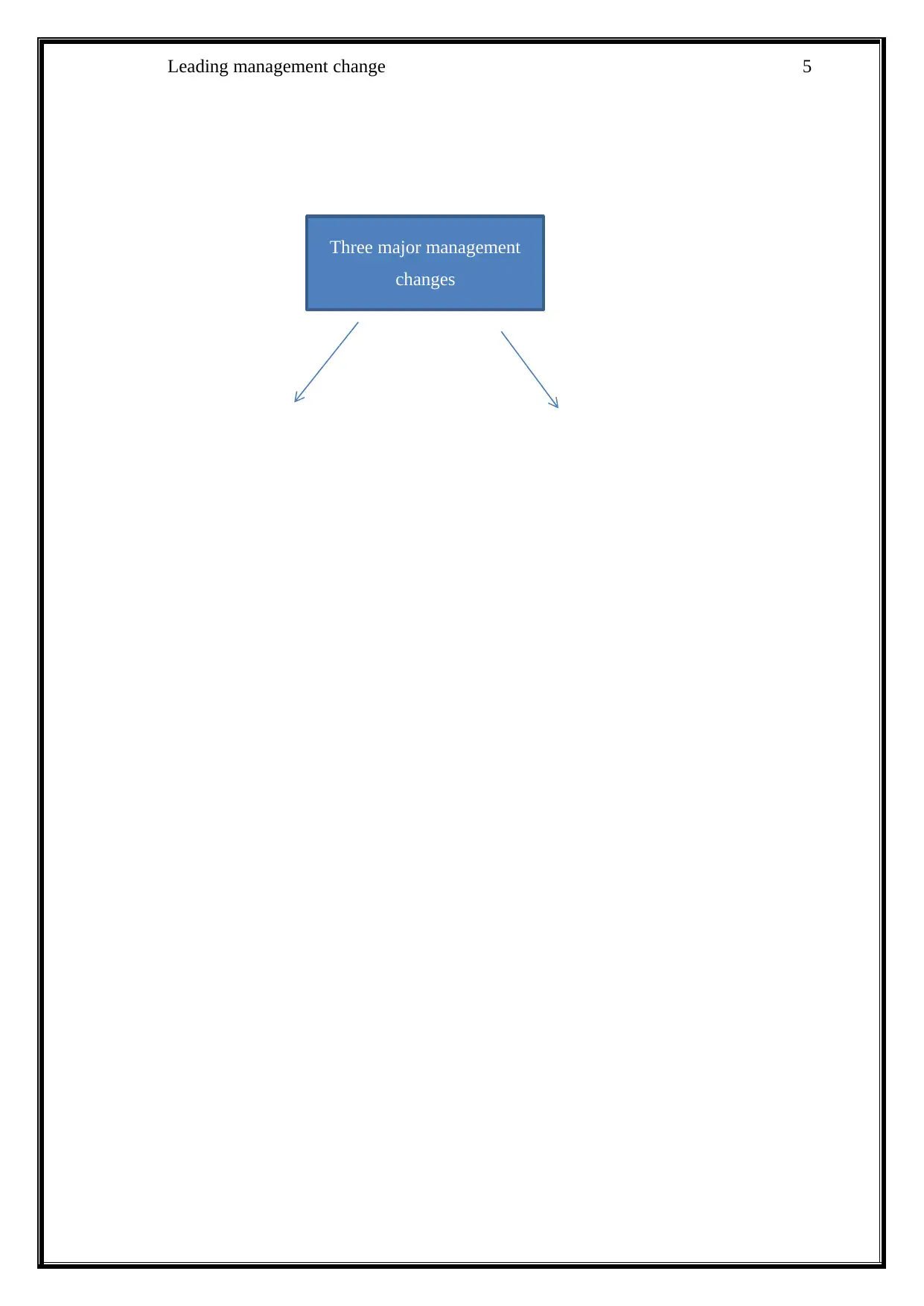
Leading management change 5
Three major management
changes
Three major management
changes
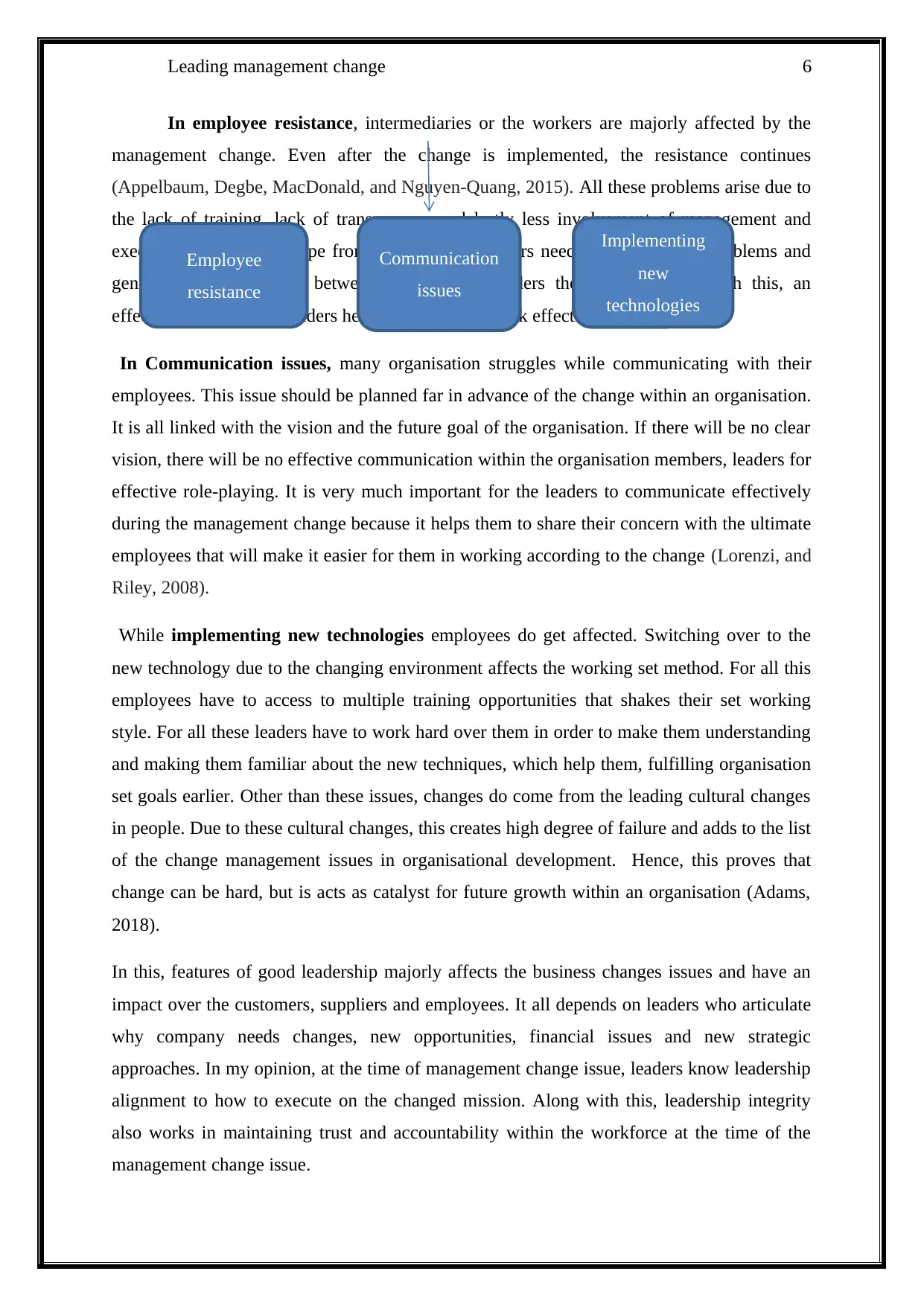
Leading management change 6
In employee resistance, intermediaries or the workers are majorly affected by the
management change. Even after the change is implemented, the resistance continues
(Appelbaum, Degbe, MacDonald, and Nguyen-Quang, 2015). All these problems arise due to
the lack of training, lack of transparency and lastly less involvement of management and
executives. In order to cope from this problem, leaders need to acknowledge problems and
generate transparency in between workers and leaders themselves. Along with this, an
effective training from leaders helps employees to work effectively (Llopis, 2013).
In Communication issues, many organisation struggles while communicating with their
employees. This issue should be planned far in advance of the change within an organisation.
It is all linked with the vision and the future goal of the organisation. If there will be no clear
vision, there will be no effective communication within the organisation members, leaders for
effective role-playing. It is very much important for the leaders to communicate effectively
during the management change because it helps them to share their concern with the ultimate
employees that will make it easier for them in working according to the change (Lorenzi, and
Riley, 2008).
While implementing new technologies employees do get affected. Switching over to the
new technology due to the changing environment affects the working set method. For all this
employees have to access to multiple training opportunities that shakes their set working
style. For all these leaders have to work hard over them in order to make them understanding
and making them familiar about the new techniques, which help them, fulfilling organisation
set goals earlier. Other than these issues, changes do come from the leading cultural changes
in people. Due to these cultural changes, this creates high degree of failure and adds to the list
of the change management issues in organisational development. Hence, this proves that
change can be hard, but is acts as catalyst for future growth within an organisation (Adams,
2018).
In this, features of good leadership majorly affects the business changes issues and have an
impact over the customers, suppliers and employees. It all depends on leaders who articulate
why company needs changes, new opportunities, financial issues and new strategic
approaches. In my opinion, at the time of management change issue, leaders know leadership
alignment to how to execute on the changed mission. Along with this, leadership integrity
also works in maintaining trust and accountability within the workforce at the time of the
management change issue.
Employee
resistance
Communication
issues
Implementing
new
technologies
In employee resistance, intermediaries or the workers are majorly affected by the
management change. Even after the change is implemented, the resistance continues
(Appelbaum, Degbe, MacDonald, and Nguyen-Quang, 2015). All these problems arise due to
the lack of training, lack of transparency and lastly less involvement of management and
executives. In order to cope from this problem, leaders need to acknowledge problems and
generate transparency in between workers and leaders themselves. Along with this, an
effective training from leaders helps employees to work effectively (Llopis, 2013).
In Communication issues, many organisation struggles while communicating with their
employees. This issue should be planned far in advance of the change within an organisation.
It is all linked with the vision and the future goal of the organisation. If there will be no clear
vision, there will be no effective communication within the organisation members, leaders for
effective role-playing. It is very much important for the leaders to communicate effectively
during the management change because it helps them to share their concern with the ultimate
employees that will make it easier for them in working according to the change (Lorenzi, and
Riley, 2008).
While implementing new technologies employees do get affected. Switching over to the
new technology due to the changing environment affects the working set method. For all this
employees have to access to multiple training opportunities that shakes their set working
style. For all these leaders have to work hard over them in order to make them understanding
and making them familiar about the new techniques, which help them, fulfilling organisation
set goals earlier. Other than these issues, changes do come from the leading cultural changes
in people. Due to these cultural changes, this creates high degree of failure and adds to the list
of the change management issues in organisational development. Hence, this proves that
change can be hard, but is acts as catalyst for future growth within an organisation (Adams,
2018).
In this, features of good leadership majorly affects the business changes issues and have an
impact over the customers, suppliers and employees. It all depends on leaders who articulate
why company needs changes, new opportunities, financial issues and new strategic
approaches. In my opinion, at the time of management change issue, leaders know leadership
alignment to how to execute on the changed mission. Along with this, leadership integrity
also works in maintaining trust and accountability within the workforce at the time of the
management change issue.
Employee
resistance
Communication
issues
Implementing
new
technologies
Paraphrase This Document
Need a fresh take? Get an instant paraphrase of this document with our AI Paraphraser
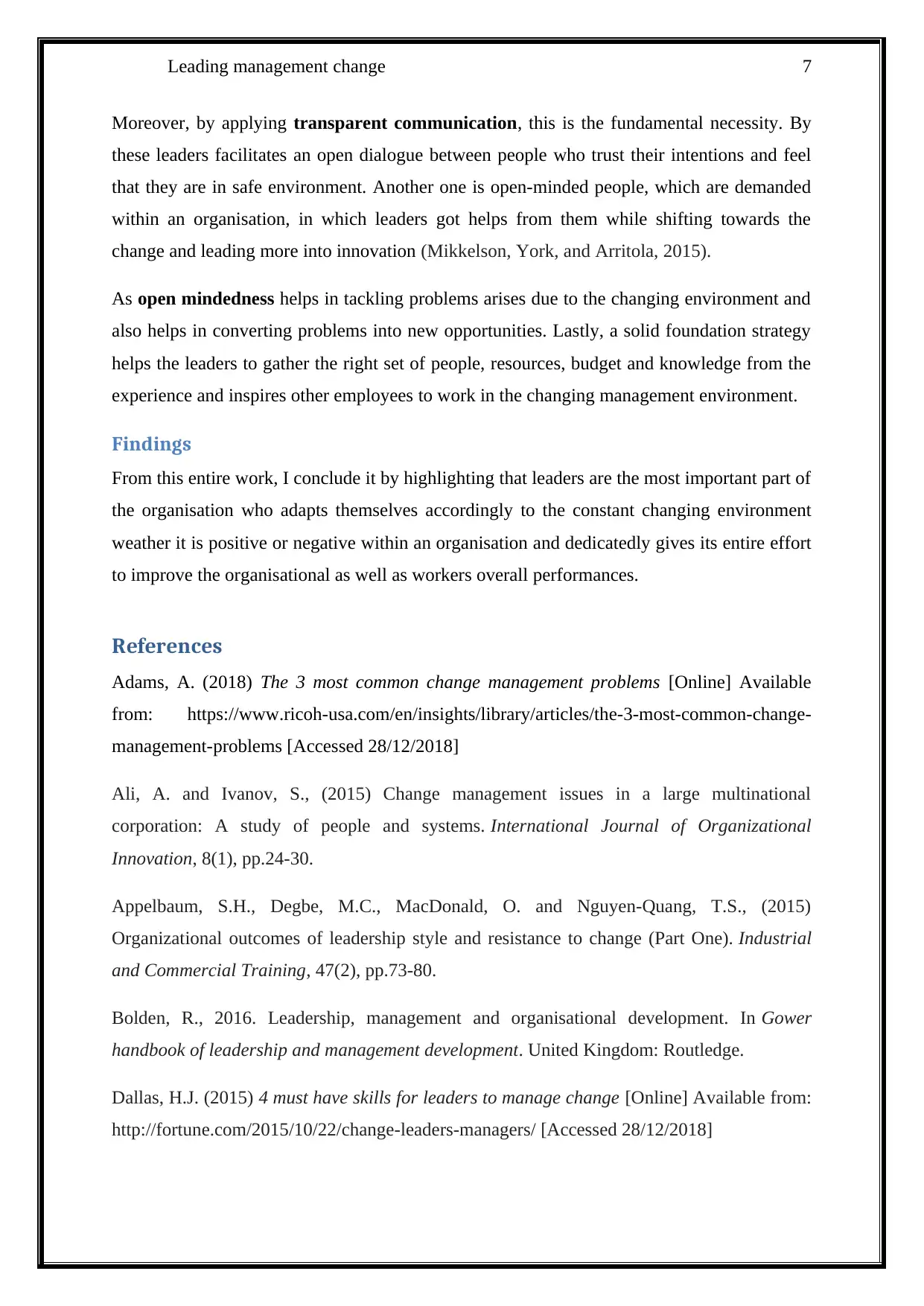
Leading management change 7
Moreover, by applying transparent communication, this is the fundamental necessity. By
these leaders facilitates an open dialogue between people who trust their intentions and feel
that they are in safe environment. Another one is open-minded people, which are demanded
within an organisation, in which leaders got helps from them while shifting towards the
change and leading more into innovation (Mikkelson, York, and Arritola, 2015).
As open mindedness helps in tackling problems arises due to the changing environment and
also helps in converting problems into new opportunities. Lastly, a solid foundation strategy
helps the leaders to gather the right set of people, resources, budget and knowledge from the
experience and inspires other employees to work in the changing management environment.
Findings
From this entire work, I conclude it by highlighting that leaders are the most important part of
the organisation who adapts themselves accordingly to the constant changing environment
weather it is positive or negative within an organisation and dedicatedly gives its entire effort
to improve the organisational as well as workers overall performances.
References
Adams, A. (2018) The 3 most common change management problems [Online] Available
from: https://www.ricoh-usa.com/en/insights/library/articles/the-3-most-common-change-
management-problems [Accessed 28/12/2018]
Ali, A. and Ivanov, S., (2015) Change management issues in a large multinational
corporation: A study of people and systems. International Journal of Organizational
Innovation, 8(1), pp.24-30.
Appelbaum, S.H., Degbe, M.C., MacDonald, O. and Nguyen-Quang, T.S., (2015)
Organizational outcomes of leadership style and resistance to change (Part One). Industrial
and Commercial Training, 47(2), pp.73-80.
Bolden, R., 2016. Leadership, management and organisational development. In Gower
handbook of leadership and management development. United Kingdom: Routledge.
Dallas, H.J. (2015) 4 must have skills for leaders to manage change [Online] Available from:
http://fortune.com/2015/10/22/change-leaders-managers/ [Accessed 28/12/2018]
Moreover, by applying transparent communication, this is the fundamental necessity. By
these leaders facilitates an open dialogue between people who trust their intentions and feel
that they are in safe environment. Another one is open-minded people, which are demanded
within an organisation, in which leaders got helps from them while shifting towards the
change and leading more into innovation (Mikkelson, York, and Arritola, 2015).
As open mindedness helps in tackling problems arises due to the changing environment and
also helps in converting problems into new opportunities. Lastly, a solid foundation strategy
helps the leaders to gather the right set of people, resources, budget and knowledge from the
experience and inspires other employees to work in the changing management environment.
Findings
From this entire work, I conclude it by highlighting that leaders are the most important part of
the organisation who adapts themselves accordingly to the constant changing environment
weather it is positive or negative within an organisation and dedicatedly gives its entire effort
to improve the organisational as well as workers overall performances.
References
Adams, A. (2018) The 3 most common change management problems [Online] Available
from: https://www.ricoh-usa.com/en/insights/library/articles/the-3-most-common-change-
management-problems [Accessed 28/12/2018]
Ali, A. and Ivanov, S., (2015) Change management issues in a large multinational
corporation: A study of people and systems. International Journal of Organizational
Innovation, 8(1), pp.24-30.
Appelbaum, S.H., Degbe, M.C., MacDonald, O. and Nguyen-Quang, T.S., (2015)
Organizational outcomes of leadership style and resistance to change (Part One). Industrial
and Commercial Training, 47(2), pp.73-80.
Bolden, R., 2016. Leadership, management and organisational development. In Gower
handbook of leadership and management development. United Kingdom: Routledge.
Dallas, H.J. (2015) 4 must have skills for leaders to manage change [Online] Available from:
http://fortune.com/2015/10/22/change-leaders-managers/ [Accessed 28/12/2018]
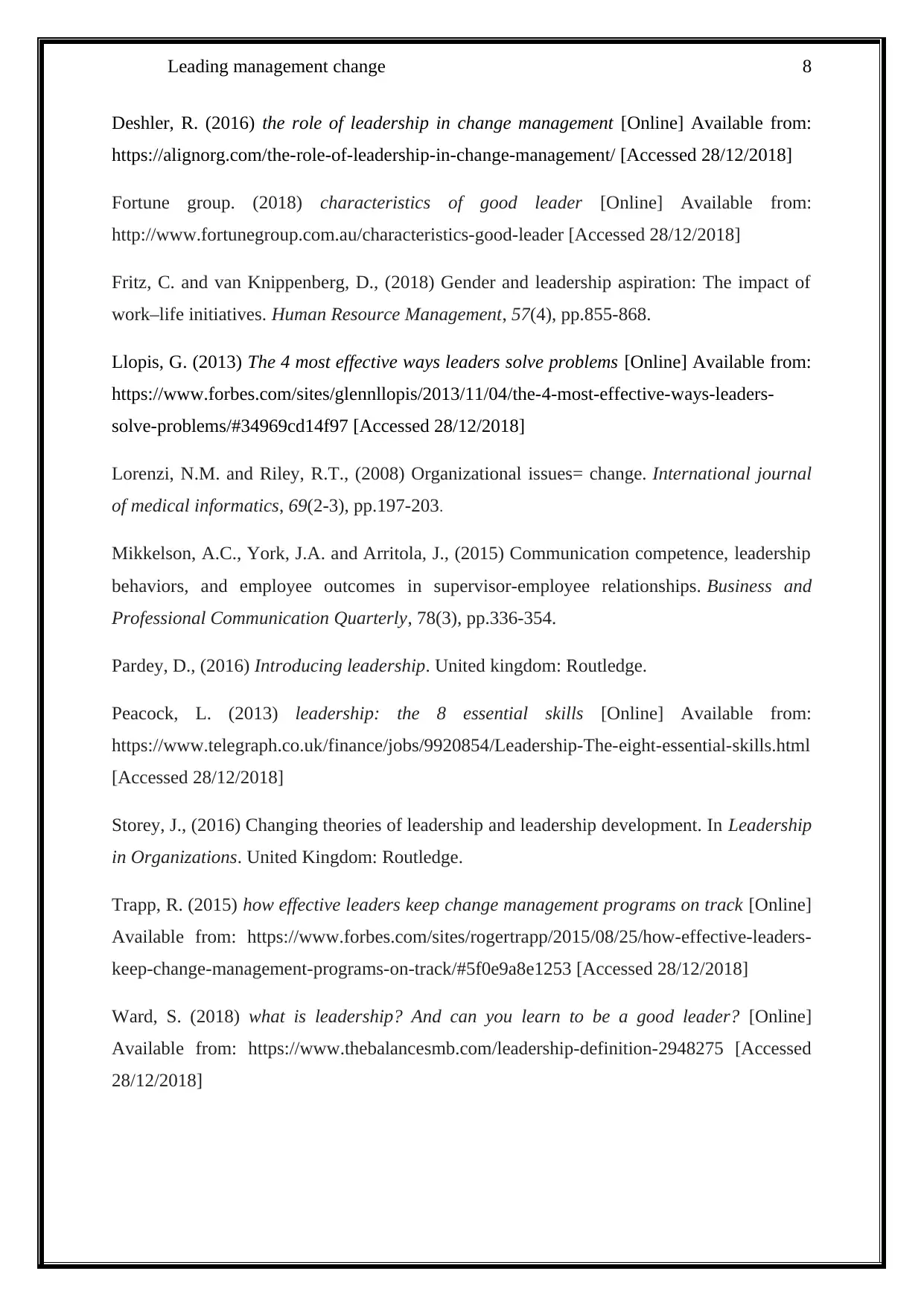
Leading management change 8
Deshler, R. (2016) the role of leadership in change management [Online] Available from:
https://alignorg.com/the-role-of-leadership-in-change-management/ [Accessed 28/12/2018]
Fortune group. (2018) characteristics of good leader [Online] Available from:
http://www.fortunegroup.com.au/characteristics-good-leader [Accessed 28/12/2018]
Fritz, C. and van Knippenberg, D., (2018) Gender and leadership aspiration: The impact of
work–life initiatives. Human Resource Management, 57(4), pp.855-868.
Llopis, G. (2013) The 4 most effective ways leaders solve problems [Online] Available from:
https://www.forbes.com/sites/glennllopis/2013/11/04/the-4-most-effective-ways-leaders-
solve-problems/#34969cd14f97 [Accessed 28/12/2018]
Lorenzi, N.M. and Riley, R.T., (2008) Organizational issues= change. International journal
of medical informatics, 69(2-3), pp.197-203.
Mikkelson, A.C., York, J.A. and Arritola, J., (2015) Communication competence, leadership
behaviors, and employee outcomes in supervisor-employee relationships. Business and
Professional Communication Quarterly, 78(3), pp.336-354.
Pardey, D., (2016) Introducing leadership. United kingdom: Routledge.
Peacock, L. (2013) leadership: the 8 essential skills [Online] Available from:
https://www.telegraph.co.uk/finance/jobs/9920854/Leadership-The-eight-essential-skills.html
[Accessed 28/12/2018]
Storey, J., (2016) Changing theories of leadership and leadership development. In Leadership
in Organizations. United Kingdom: Routledge.
Trapp, R. (2015) how effective leaders keep change management programs on track [Online]
Available from: https://www.forbes.com/sites/rogertrapp/2015/08/25/how-effective-leaders-
keep-change-management-programs-on-track/#5f0e9a8e1253 [Accessed 28/12/2018]
Ward, S. (2018) what is leadership? And can you learn to be a good leader? [Online]
Available from: https://www.thebalancesmb.com/leadership-definition-2948275 [Accessed
28/12/2018]
Deshler, R. (2016) the role of leadership in change management [Online] Available from:
https://alignorg.com/the-role-of-leadership-in-change-management/ [Accessed 28/12/2018]
Fortune group. (2018) characteristics of good leader [Online] Available from:
http://www.fortunegroup.com.au/characteristics-good-leader [Accessed 28/12/2018]
Fritz, C. and van Knippenberg, D., (2018) Gender and leadership aspiration: The impact of
work–life initiatives. Human Resource Management, 57(4), pp.855-868.
Llopis, G. (2013) The 4 most effective ways leaders solve problems [Online] Available from:
https://www.forbes.com/sites/glennllopis/2013/11/04/the-4-most-effective-ways-leaders-
solve-problems/#34969cd14f97 [Accessed 28/12/2018]
Lorenzi, N.M. and Riley, R.T., (2008) Organizational issues= change. International journal
of medical informatics, 69(2-3), pp.197-203.
Mikkelson, A.C., York, J.A. and Arritola, J., (2015) Communication competence, leadership
behaviors, and employee outcomes in supervisor-employee relationships. Business and
Professional Communication Quarterly, 78(3), pp.336-354.
Pardey, D., (2016) Introducing leadership. United kingdom: Routledge.
Peacock, L. (2013) leadership: the 8 essential skills [Online] Available from:
https://www.telegraph.co.uk/finance/jobs/9920854/Leadership-The-eight-essential-skills.html
[Accessed 28/12/2018]
Storey, J., (2016) Changing theories of leadership and leadership development. In Leadership
in Organizations. United Kingdom: Routledge.
Trapp, R. (2015) how effective leaders keep change management programs on track [Online]
Available from: https://www.forbes.com/sites/rogertrapp/2015/08/25/how-effective-leaders-
keep-change-management-programs-on-track/#5f0e9a8e1253 [Accessed 28/12/2018]
Ward, S. (2018) what is leadership? And can you learn to be a good leader? [Online]
Available from: https://www.thebalancesmb.com/leadership-definition-2948275 [Accessed
28/12/2018]
1 out of 9
Related Documents
Your All-in-One AI-Powered Toolkit for Academic Success.
+13062052269
info@desklib.com
Available 24*7 on WhatsApp / Email
![[object Object]](/_next/static/media/star-bottom.7253800d.svg)
Unlock your academic potential
© 2024 | Zucol Services PVT LTD | All rights reserved.





